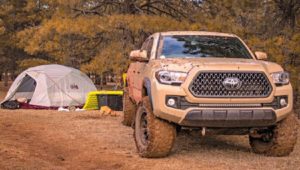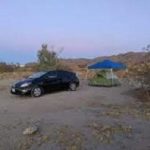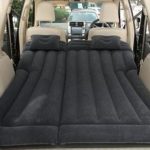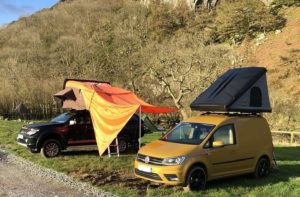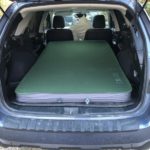Disclosure: this post may contain affiliate links. As an Amazon Associate we earn from qualifying purchases.
Some people sleep in a car while others prefer a tent as a way of relaxing after a long drive on a road trip or when camping. But what is the difference between sleeping in a car vs a tent? As a seasoned camper, I will tell you.
It’s usually enjoyable to sleep in a car or tent in a familiar and secure environment and as a large group of either family or friends. But this does not mean you cannot camp alone or as a couple.
There are several essentials one should have when planning a trip that requires them to sleep in a car or tent. The exact items that you carry should be according to the trip you’re taking and factors like weather, difficulty, duration, cost and distance should be considered.
Contents
Must Have Items When Sleeping in Car or Tent
Sleeping a tent is not very much different from sleeping in a car. The following items are essentials depending on your adventure. They are quite similar and must-have items if you are planning to sleep inside a car or a tent.
- You need some guidance tools to direct you to the location you choose for your camp or stay. A map, compass, altimeter, GPS device, personal locator beacon (PLB) or satellite messenger will be handy to provide you with exact coordinates for the location.
- When camping in an open space with no electricity connection, a headlamp is necessary at night for you to set up things in place, when cooking or when taking a bath. Extra batteries for the headlight are vital to carry in case it runs out of charge. You can also consider going for a rechargeable lantern for camping like these ones we reviewed here.
- A First aid kit equipped with adhesive bandages of various sizes, several gauze pads, adhesive tape, disinfecting ointment, over-the-counter pain medication, pen and paper, Nitrile gloves and foot care and insect repellent is a necessity for your care. Replenishing the kit with new health care products at the start of your journey. It is also advisable to check the expiry dates of all products in your first aid kit as you replenish.
- There is a high chance you will require a knife or a pair of scissors to cut up things, during food preparation and there is always an emergency where sharp items come in handy. A survival knife is more recommended since it is more multipurpose.
- Lighters and a portable stove are not questionable to carry. You need them eventually to light up a bonfire if it gets cold in the night and the stove is to cook up a quick meal for the night. You can also avoid cooking by stocking up on simple ready-made meals in a cooler box or hot pot (and non-perishable foodstuffs and drinks (Burgers, Sandwiches, Milk, and Water) from home.
- Adequate bedding and clothing should be in your backpack. When deciding what sought of clothing and bedding you will need to carry along, you have to consider the number of people who will be with you in the car or tent, the weather of the location you will be in and the amount of time you’ve set out for your adventure. If you are going camping or hiking, the experience might get exciting for you to want additional time from what you had allocated before. Extra clothes are part of the priority of items to have.
Sleeping in A Car Vs Tent
There are a couple of aspects one needs to consider when sleeping in a car as compared to a tent. Below we are going to compare sleeping a car vs tent side by side.
-
Setting up your tent or car
When using a tent as your shelter, you first need to have the knowledge on types of tents and how to pitch them. A secure and flat site ground will be ideal for the stability of your tent.
The direction where light and wind are coming from is also a key consideration to ensure your tent does not collapse in the middle of the night.
Going by the choice of a car, you need an overnight parking space. For those who are wondering, Can you sleep in your car in National parks? In most states, you might need to obtain a permit if the selected park allows people to park and the charges that apply.
In most national parks (in USA) I know, they have designated camping areas and thus one is not allowed park and sleep just anywhere. For example inside Grand Canyon National Park, we have Mather Campground where one is allowed to sleep in their car or tent. This is mostly due to safety reasons.
One thing to keep in mind is to not park where others are passing so as not to bother anyone. You also need to display all the required permits.
If you someone who want to enjoy both sides of car and tent camping you can mount a good rooftop tent on your car.
-
Weight control
Tents are easy to work with and manage when moving around from one place to another. All you need is to pitch it and bring it down when necessary. The amount of time for set up is also minimal. With cars, you need to ensure your vehicle can carry and accommodate all the supplies.
It is also necessary to ensure the car battery is charged for it to start without complication. Otherwise, you will get stuck in the jungle if you have no help around to jump-start the car. Camping in the forest or on the mountainous area also needs you a powerful car that is a four-wheel drive to navigate through.
-
Cost efficiency
You should not cancel your trip because you cannot afford to purchase a tent or you don’t have a car. There is a better and affordable solution to hiring for your use.
It’s also possible to hire a car from a car rental or a friend. However, the cost of hiring a tent is much cheaper than that of a car. The risks of having a car are also very high because it can be damaged by the rough terrains depending on your site selection or get into an accident that will cost an arm and a leg to repair.
A tent has lesser risks involved and less likely to be damaged. The repairs for a tent are also manageable. However, most of the time, one requires a car to transport the tent and the camping gear to the camping site.
-
Ventilation
Cars are not well ventilated when all windows are closed making it difficult to sleep in. You are advised to leave your windows open a little to allow circulation of air. However, it’s also risky if you are in a location with wild animals.
Nevertheless, one cannot suffocate in a car if the AC vents are not closed. A vehicle is designed in such a way that it allows air to move from outside. However, ensure you don’t park your vehicle near something that emits carbon monoxide gas.
Always ensure your exhaust pipe is unobstructed since the poisonous exhaust gases can find their way back into the vehicle. There has been cases of people who succumbed in their vehicles due to obstructed exhaust pipe and carbon monoxide.
Tents are designed in a way to allow ventilation around. They are also cozy and comfortable to sleep in. Cars have no enough room to sleep facing any direction.
-
Sunshine, Lighting, and Rain
Sleeping in a car can be very challenging when the morning sun is coming out. Cars are not good at blocking the sun rays from penetrating through the glass. Tents offer a certain level of light protection because of the sun-proof materials they are made from. Most tents are made from waterproof fabrics which are;
- Polyester
- Nylon
- Polyethylene
- UV-Tex 5
- Canvas (and poly-canvas)
- Cuben fiber
- Gore-Tex
- Vapex
-
Beddings
Cars are already installed with seats which can be used to sleep on if positioned accordingly. You might not need to carry a mattress. However, for ultimate comfort, we recommend these car camping mattresses especially for couples. All you need is insulated blankets and camping pillows.
In a tent a mattress is essential, inclusive of other beddings to keep warm otherwise your night will be horrible. A night full of tossing and turning till morning comes. Warmth and security are key for your enjoyment.
-
Entertainment and Devices
Tents don’t have sockets or electrical cables to charge devices. Phones and other portable electricals should charge before to avoid any inconveniences with your entertainment setup. A car is useful in this aspect because it allows one to watch movies from small LCD screens, listen to music, and charge your phone. A car has light fixtures while tents need to be installed with bulbs.
-
Privacy and Hygiene
If you are sleeping in a car, you need to have enough changing clothes and toiletries that will save you a hustle of looking for water to bath to keep your hygiene up.
It is impossible to also bath in a car but it is easy for you to put up an extra pop-up shower tent or a make shift bathroom in consideration of privacy to take a shower where necessary. You can check our exclusive guide on how to shower when car camping.
Closing Remarks
You can see there exist some differences between sleeping in a car as compared to a tent. Both sleeping in a car and tent have pros and cons to consider when camping, going on a road trip, hiking and on a picnic or when you are choosing to stay in a tent or car when one does not have an apartment.
The above factors can help you make a decision that is suitable and specific to your needs with consideration of the number of persons accompanying you. The larger the group the more cost implication where money is involved.
However, it is evident when comparing sleeping in a car vs tent, the necessities required are very similar. It is thus important to weigh all the other factors against one’s preferences.
If one can’t decide between sleeping in car or tent, they can install a rooftop tent on their vehicle to enjoy the best out of the two worlds.
I hope this article is useful to you and provides you adequate information on sleeping in car vs tent.
Amazon and the Amazon logo are trademarks of Amazon.com, Inc, or its affiliates.

